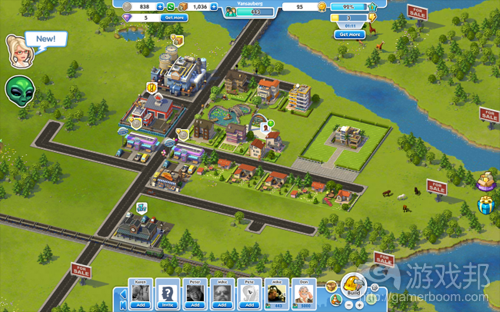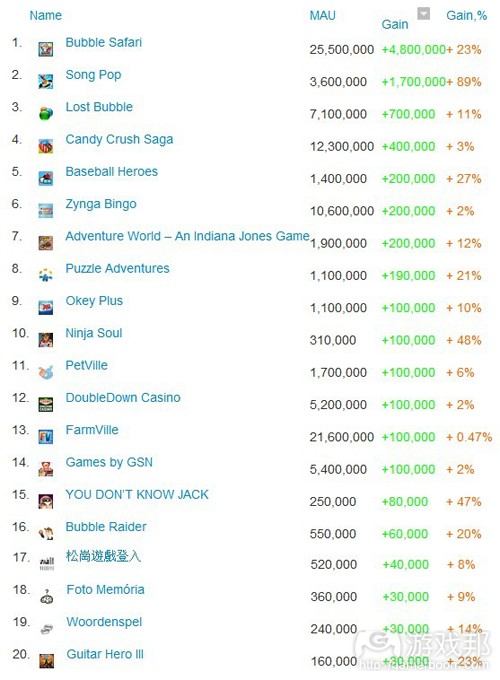每日观察:关注亚马逊招聘社交游戏人才(6.26)
1)据insidesocialgames报道,Maxis与EA Playfish开发的《模拟城市社交版》日前已在Facebook上线。
其游戏玩法是创建一个动态变化的个性化城市,它代表EA过去一年发布的最顶级社交游戏,有可能为该公司引进大量用户。EA上一款模拟游戏《模拟人生社交版》在2011年9月份最高峰时的DAU为1110万,但目前已降至290万。
2)英国社交游戏发行商We R Interactive日前宣布将通过新款社交游戏《Lyroke》复兴音乐游戏题材,并与环球音乐集团英国公司签署协议,将在该游戏中植入该唱片公司艺人的有关元素。
《Lyroke》结合了音乐视频与交互玩法,将于今年首先在Facebook上线,随后再推向其他平台。
据报道,《摇滚乐团》工作室Harmonix也曾在4月份透露将通过新作《Rock Band Blitz》重振音乐游戏。
3)据路透社报道,亚马逊最近在LinkedIn贴出的招聘广告表明,该公司已成立所谓的亚马逊社交游戏集团(Amazon’s Social Games Group),其中一则招聘高级社交游戏工程师的信息指出,该职位“在亚马逊中处于先锋地位”。
4)英特尔旗下的网络安全服务McAfee最新调查显示,有37%美国青少年使用笔记本上网,30%使用台式电脑上网,仅有13.5%青少年使用智能手机上网,而平板电脑青少年用户的这一比例仅为5%(游戏邦注:其调查样本是2017名美国青少年网络用户(介于13-17岁),以及拥13-17岁子女的家长)。
目前最受青少年欢迎的社交网站是Facebook,有89.5%受访者是Facebook用户;居于其次的是Twitter,其用户占比48.7%,Google+用户占比也达到41.5%。而Tumblr在青少年用户中占比33%,它在女生群体中更受欢迎;4chan在青少年用户中占比23%,其中多为男生用户,Tumblr和4chan这两者发展速度超过了其他社交网站。
Pinterest与Myspace使用率不相上下,分别为20%和18%。而基于智能手机平台的Foursquare和其他签到服务在青少年群体中的人气并不算高,其使用率仅为12.2%。
有半数青少年网络用户表示,他们多数时候是查看他人动态,而非更新自己的内容。仅有6%受访者会与他们分享“几乎所有的事情”。有60%青少年用户每天都会查看自己的帐号,41%会“不断”查看帐号。
79%青少年称自己会隐瞒在线活动,以免被父母发现,一方面是因为他们想保留自己的网络隐私,一方面是他们上网时长超出了父母的想象。他们最常进行的上网活动包括访问暴力内容(占比43%),性话题/情色信息(分别占比36%和32%),观看盗版电影(30.7%),还有15%青少年会入侵他人帐号。这些青少年平均每天在线时长约5小时,而家长却以为子女每天平均上网时间为3小时;仅有10%左右受访者每天在线时间超过10小时。
这些青少年隐藏自己上网活动所采取的措施包括,清除浏览器历史记录(53%),当家长在身边时就关闭浏览器(46%),删除内容(34%),还有一些更高级的手段则是更改隐私设置(20%)和私人浏览器模式(20%),以及复制社交网站个人档案(9%)。
5)在本周MAU增长最快的Facebook游戏榜单中,Zynga游戏《Bubble Safari》位居榜首,新增480万MAU,增幅达23%。
FreshPlanet游戏《Song Pop》位列第二,新增170万MAU,增幅达89%。Peak Games游戏《Lost Bubble》排名第三,新增70万MAU,增幅为11%。King.com游戏《Candy Crush Saga》位居第四,新增40万MAU,增幅为3%,Syntasia作品《Baseball Heroes》排名第五,新增20万MAU,增幅为27%。
排在第20名的是一款《吉他英雄》的模仿游戏《Guitar Hero III》,新增3万MAU,增幅达23%。(本文为游戏邦/gamerboom.com编译,拒绝任何不保留版权的转载,如需转载请联系:游戏邦)
1)SimCity Social now live on Facebook
Mike Thompson
Maxis and EA Playfish’s SimCity Social is now live on Facebook.
The game is a new social citybuilder based on the popular brand of Maxis games that began in 1989. SimCity Social was officially announced earlier this month during EA’s E3 press conference; the developer shared a hands-off demo with us last week. As you’d expect, gameplay centers on building a personalized city that will dynamically change and grow as the chapter-based storyline progresses. The key differences between SimCity Social and Zynga’s CityVille are the former’s good vs. evil dichotomy, brand recognition and loose affiliation with upcoming PC game SimCity.
SimCity Social is EA’s highest-profile social game to launch in the past year and could provide a significant traffic boost for the company on Facebook. EA’s last “Sim” game to hit the social network was The Sims Social, which peaked in September 2011 with 11.1 million daily active users, though traffic has now dropped to 2.9 million.(source:insidesocialgames)
2) We R Interactive aims to revive music genre through social game
by Mike Rose
In the wake of the music game boom on consoles, UK-based social games publisher We R Interactive is attempting to revive the genre via a new social game, and has signed an agreement with Universal Music UK to feature artists from the record label in its upcoming game Lyroke.
Lyroke, which is set to combine music videos with interactive play when it launches later this year, will initially roll out on Facebook before coming to other platforms. Universal’s director James Healy noted that social gaming has opened up many opportunities for gamers to interact with music and artists.
Rock Band studio Harmonix also revealed in April that it is hoping to revitalize the music game genre, with the upcoming launch of Rock Band Blitz. (source:gamasutra)
3)Amazon wants its social games arm to be ‘Worldwide Breaking News’
by Joe Osborne
It’s been a little while since we’ve last heard of Amazon’s efforts in the social games space, but that doesn’t mean the company is any less bent on making a bog show of it. According to a Reuters report, posters plastered on the walls of the online retailer’s new Seattle, Wash. campus dub Amazon’s Social Games Group as “Worldwide Breaking News.”
Other posters–and job postings on LinkedIn and elsewhere–read, “The Group is growing fast” and, “We’re actively looking,” Reuters reports. One LinkedIn job posting in particular for a Senior Social Games engineer claims that the Social Games Group is “working on a cutting edge initiative within Amazon.”
As Reuters points out, Amazon has already successfully branched out into areas beyond retail, like cloud computing and device sales. But gaming is another animal entirely, and social on the whole is something that the company doesn’t have a lot of experience. Still, if there’s any major company left to get into social games, it’s Amazon. Then again, we said that about Google at the time–zing!(source:games)
4)McAfee: Sneaky Teens Surf On PCs More Than Mobile, Facebook Rules Over All Other Social Networks
Ingrid Lunden
Going mobile may be the mantra for a lot of tech companies these days, but if they’re in the business of targeting teenagers with their services, perhaps they should think twice: over 37 percent of teens use laptops, and a further 30 percent rely on desktop machines to surf online and engage with digital content, but only 13.5 percent use smartphones and only five percent use tablets, according to a new study out today from Intel-owned security specialists McAfee.
The study, covering online activity among U.S. teens, also reveals a pretty massive disconnect between parents and their kids when it comes to how the latter is using the Internet — with some big security implications within that — and the revelation that teens are not actually that rebellious compared to their adult counterparts when it comes to engaging with social media, in many cases using the same sites their parents do to communicate with each other.
McAfee, working with market analysts TRU, based their results on 2,017 online interviews in the U.S. among teens ages 13-17 and parents of teens ages 13-17, with respondents split equally among the two demographics.
By far, the most popular social media site among teens is Facebook, with 89.5 percent of respondents using the site. Twitter comes in second with 48.7 percent and Google+ not actually that far behind at 41.5 percent. Tumblr (33 percent of all teens), it notes, is more popular with teen girls than boys; while 4chan (23%) is showing the reverse trend: and McAfee notes that both sites are growing faster than other social networking sites.
Pinterest is being used nearly as much as Myspace (20%; 18%), and it will be worth watching to see whether Myspace, which recently turned around its traffic with the introduction of Facebook’s social graph, can gain back a bit more mindshare with the younger set.
In contrast — and possibly in keeping with smartphone use actually not being as popular as PCs — Foursquare and other check-in services are not so hot, with only 12.2 percent using these.
McAfee describes teen usage on social networks as “stalking” rather than sharing: half of teens responding said they mostly observed others rather than posted updates about themselves.
Only six percent said they shared “almost everything.” Nevertheless, they are huge social network users: 60 percent check their accounts daily, and 41 percent said they check accounts “constantly.”
Another takeaway from the study is that teens appear to be getting more savvy about their online activity — perhaps in keeping with the massive increase in what there is on offer, and the fact that they are a more digitally native demographic.
“This is a generation that is so comfortable with technology that they are surpassing their parents in understanding,” noted Stanley Holditch, Online Safety Expert for McAfee, in a release.
The study found that 79 percent of teens said they hid their online behavior from their parents: partly to keep private what they’re actually doing online, and partly because they’re online for a lot longer than parents think. Popular activities include accessing violent content (43%); sexual topics/porn (36%; 32%); and watching pirated movies (30.7%). A whole 15% are hacking other people’s accounts. Meanwhile, teens spend about five hours a day online; while parents only think their kids spend an average of three hours a day online. McAfee found that just over 10 percent spend more than 10 hours per day online.
Teens hiding what they do from parents has gone up massively since 2010, when only 45 percent said they hid their behavior, and is a disconnect when compared to what parents think: half of parents responding to the study said they knew what their teen kids did online.
So what are they doing to hide their behavior? The most popular thing to do is clear browser history (53%); close browsers when parents were around (46%); deleting content (34%). Some were more sophisticated and changed their computer’s privacy settings (20%) and private browsing modes (20%) and duplicate social networking profiles (9%).(source:techcrunch)
5)Bubble Safari comes out on top of this week’s fastest-growing Facebook games by MAU
Mike Thompson
Zynga’s Bubble Safari took the top spot on this week’s list of fastest-growing Facebook games by monthly active users, gaining 4.8 million MAU for a 23 percent increase.
FreshPlanet’s Song Pop came in at No. 2 with 1.7 million MAU, an 89 percent increase. Peak Games’s Lost Bubble took the No. 3 position with 700,000 MAU, an 11 percent gain. King.com’s Candy Crush Saga was up by 400,000 MAU, a 3 percent increase that let it take the No. 4 spot. Syntasia’s Baseball Heroes was in the No. 5 position with 200,000 MAU, a 27 percent gain.
Five other games on the list show gains greater than 20 percent. Ravensburger Digital GmbH’s Puzzle Adventure was up by 100,000 MAU for a 21 percent increase. Ninja Soul brought in 100,000 MAU for a 48 percent gain. Jellyvision’s new trivia game You Don’t Know Jack brought in 80,000 MAU, a 47 percent gain. Playdemand’s Bubble Raider (which didn’t appear on last week’s list because of a classification error in AppData) was up by 60,000 MAU for a 20 percent gain. Finally, a clone of Activision’s Guitar Hero III came in at No. 20 on the list with 30,000 MAU, pirating a 23 percent increase.(source:insidesocialgames)












































 闽公网安备35020302001549号
闽公网安备35020302001549号